Contents
Market Overview
Election and poll drama spurred markets this week. Polls put Biden comfortably in front, while Trump seeks to jump back on the campaign trail as early as this weekend. Markets are now beginning to price in a blue wave sweep, which lifts the idea of opportunistic reflation strategy that we had put forward. The 30yr U.S. Treasury widened 8bps this week, 25bps wider over the past month, and even traded through the 200 day moving average (1.56%). Stimulus hopes may have faded even if dialogue channels remained open, but expectations have shifted to 1Q. Powell may have received the cold shoulder after calling out for further fiscal stimulus at the NABE Conference, but this was overshadowed along with FOMC minutes. Ultimately, stronger Eurozone PMIs in the UK and Germany, the end of Golden Week, stronger credit extension out of China and then PMIs lifted markets. Hurricane Delta was also responsible for the largest weekly gain in crude oil since June as operations in the Gulf of Mexico were temporarily shut-down. All in all, the macro developments were conducive for an upbeat week for EM credit that ended up 1.1% as Sub-Saharan Africa performed very well. Meanwhile, Turkey was noticeably volatile after intentions to test the S-400 missile system, which drew criticism from Biden, pushed the lira to all-time highs and forced the CBRT to raise swap rates. Into next week we can expect Chinese export growth to accelerate and validate a continuing recovery as CNH moves to 18-month highs, although inflation is expected to step down to 1.6%. In opposite fashion, inflation is steadily rising in India and expected to reach to 6.9%. Higher core is still the base case, even if industrial production continues to decline. On the topic of industrial production, Mexico is expected to report a decline, then economic activity out of Brazil, Colombia and Peru are events to watch. Rates should also be held unchanged out of Chile, South Korea and Indonesia, while CEE and Israeli inflation is unlikely to break any recent trends.
Fixed Income
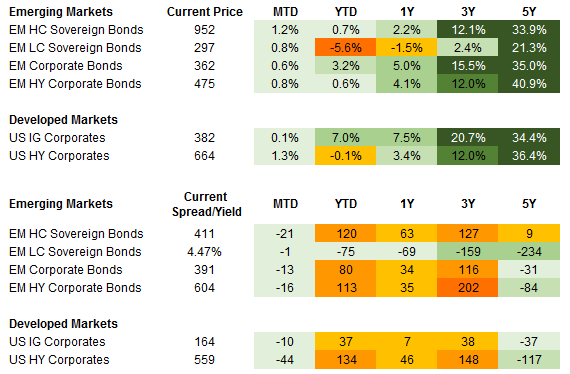
Equities
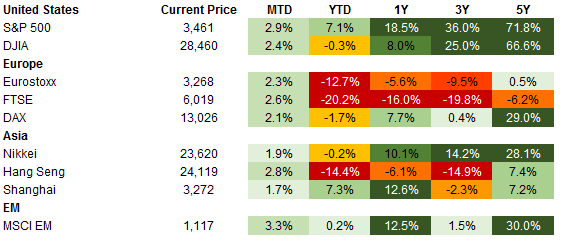
Commodities

Source for data tables: Bloomberg, JPMorgan, Gramercy. EM Fixed Income is represented by the following JPMorgan Indicies: EMBI Global, GBI-EM Global Diversified, CEMBI Broad Diversified and CEMBI Broad High Yield. DM Fixed Income is represented by the JPMorgan JULI Total Return Index and Domestic High Yield Index. Fixed Income, Equity and Commodity data is as of October 9, 2020 (Mid Afternoon).
Emerging Markets Weekly Highlights
Ecuador appoints a new Finance Minister and faces manageable near-term IMF conditionality to unlock large external financing ahead of critical elections in early 2021, Ghana announced a power sector agreement that will help reduce government costs, political risk back in focus in Thailand as anti-government groups plan new protests and a “dovish” Reserve Bank of India (RBI) grapples with higher inflation.
Ecuador appoints a new Finance Minister and faces manageable near-term IMF conditionality to unlock large external financing ahead of critical elections in early 2021
Event: Finance Minister, Richard Martinez, who presided over the recent successful sovereign debt restructuring and IMF program negotiations, resigned and was replaced by Mauricio Pozo, a respected orthodox economist. Meanwhile, the first IMF staff report under the new program confirmed a front-loaded schedule of disbursements and manageable pre-election conditionality.
Gramercy commentary: Both developments are constructive from an investors’ point of view. Former Finance Minister Martinez, who was market-friendly, has been replaced by another market-friendly figure. Minister Martinez was facing impeachment procedures in Congress and his departure is likely a preemptive strategic move by the Moreno Administration. It ensures that potentially politically damaging public discussions of the government’s economic policies will be avoided during the pre-election period. Incoming Finance Minister Mauricio Pozo is a respected orthodox economist and former banker, who already served in the same capacity in the early 2000s. He comes with a higher political profile and more experience than Martinez and will likely ensure market-friendly policy continuity for the remaining seven months of the current administration as well as constructive engagement with the IMF. Pozo has listed three main priorities for his term in office: i) consolidation of the economic plan and implementation of the IMF program, ii) building consensus and drafting proposals on tax and labor reforms to be handed over to the next administration, and iii) helping the economy cope with the emergency situation due to COVID-19. In terms of IMF cooperation, we think conditionality over the near-term is manageable for the government, which will unlock vital USD inflows into Ecuador’s liquidity-starved dollarized economy ahead of critically important presidential and general elections in February 2021 (with a potential presidential runoff in April). The external funding Ecuador is set to receive for the remainder of the year is sizable – close to $7 billion or 7% of GDP ($4 billion from IMF, $1.7 billion from China and $1 billion from the World Bank). Those funds will help offset some of the economic and social fallout due to the pandemic. All else being equal, this should support center-right presidential candidate and early frontrunner Guillermo Lasso. Although it is still very early and the elections are likely to be competitive, unpredictable and volatile amid a crowded field of candidates, we foresee a structural improvement in market sentiment toward Ecuador in the event Lasso cements a solid lead over the coming months.
Ghana announced a power sector agreement that will help reduce government costs
Event: Cenpower, a domestic power generation company responsible for 10% of Ghana’s electricity generation, committed to switch its primary fuel source to natural gas from light crude oil and signed an agreement with GNPC (Ghana National Petroleum Corporate), the government owned oil and gas company.
Gramercy commentary: The announcement is credit positive and an incremental step to reducing the annual energy sector related costs endured by the government due to uneconomical PPA contracts. The deal is estimated to save the authorities $3 billion over the remaining life of the contract or just below $160 million annually (~0.2% of GDP). The total off-budget fiscal burden of these contracts is estimated at 1-2% of GDP. While this development, particularly in the current economic backdrop, is promising for further renegotiation of these contracts, the outlook for the sovereign’s overall liquidity position remains challenging absent the ability to fiscally consolidate in 2021 (2020 deficit forecast of 11.4% of GDP). The government swiftly and pragmatically secured emergency financing from the IMF early on in the pandemic and successfully issued bonds mid-year but will likely need additional multilateral funds in 2021, if the road to economic recovery is prolonged. We expect policy continuity and pragmatism post-election in December but relatively low FX reserves, a shallow domestic market, and high financing needs pose liquidity and debt sustainability risks and will likely be a key aspect of any new funding discussions. With this being said, the authorities have repeatedly emphasized the importance of Ghana maintaining market access.
Political risk back in focus in Thailand as anti-government groups plan new protests
Event: Thailand’s political risk is back in focus as high school and university student groups plan an anti-government protest in Bangkok on October 14th. Organizers anticipate at least 100,000 participants. Smaller-scale protests began earlier this year after the Thai court voted to dissolve Future Forward, an opposition party in favor of returning Thailand to democracy after the 2014 military coup.
Gramercy commentary: The protests are largely united around three demands: i) dissolution of the parliament, ii) free speech for critics of the monarchy, and iii) changes to the military-backed constitution. Certain groups also favor further curbing some of the Thai monarchy’s powers. The protests are adding to the challenges faced by the current government, led by Prime Minister Prayuth Chan-Ocha, which came to power during the military coup in 2014. The Thai economy has been among the hardest hit in the region due to its exposure to tourism and global trade, despite comparatively low COVID-19 cases and deaths. While we do not expect the movement to unseat Chan-Ocha in the near term, unrest will likely linger into 2021 and could challenge reform and recovery prospects over the medium term. The credit’s fairly solid investment grade profile and robust balance sheet combined with still slightly positive real yields should help anchor the baht albeit structural trends, depending on supply chain evolution and domestic policy and governability, could begin to challenge this view over time.
“Dovish” Reserve Bank of India (RBI) grapples with higher inflation
Event: The RBI appointed three new members to its monetary policy committee, all of whom are expected to take a dovish approach to rates for the remainder of 2020. Policymakers must determine how to balance growing inflation concerns with stimulating the economy. For the past five months, inflation has exceeded the bank’s 2-6% inflation target band, most recently hitting 6.7% in September while PMI composite data for September moved into expansionary territory for the first time since March.
Gramercy commentary: While the new board members have a dovish bias and the RBI’s main focus will be to keep borrowing costs in check, we expect the RBI to remain somewhat constrained in the near-term by growing inflation pressures, particularly as economic data continue to improve. However, if the recovery proves more gradual into 2021, additional rate cuts or potential adoption of more unconventional monetary policy is possible. In general, we expect growing challenges with respect to the greater use of developed market-like monetary policy tools in emerging markets, particularly in the event budget deficits and financing needs remain large in 2021.
Emerging Markets Technicals
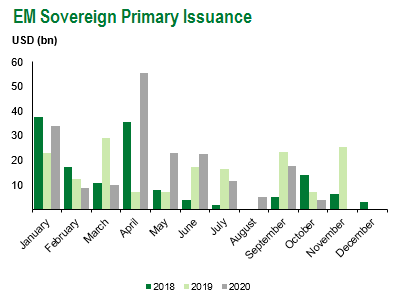
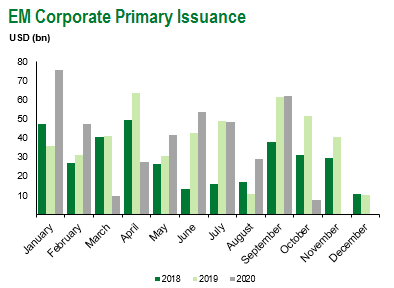
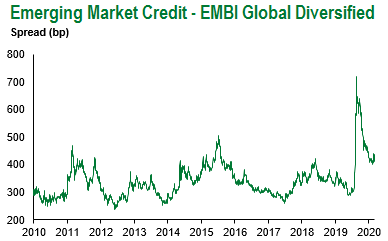
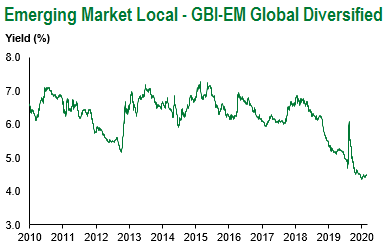
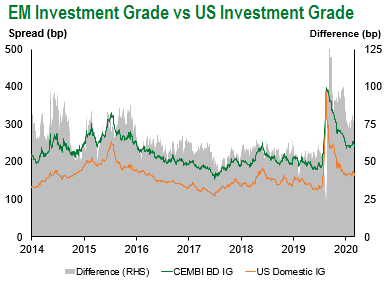
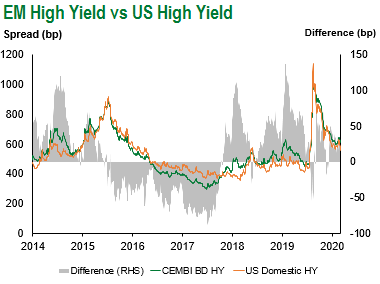
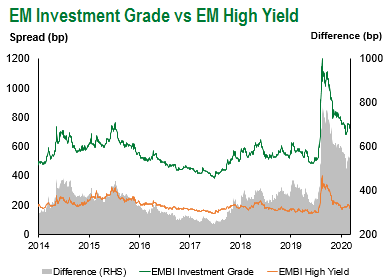
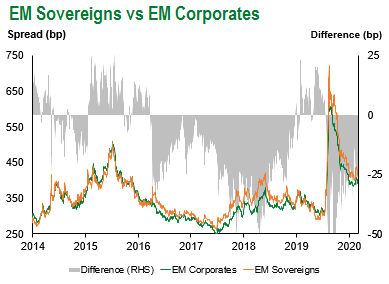
Emerging Markets Flows
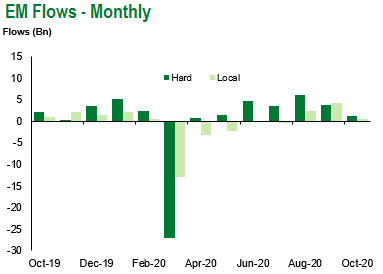
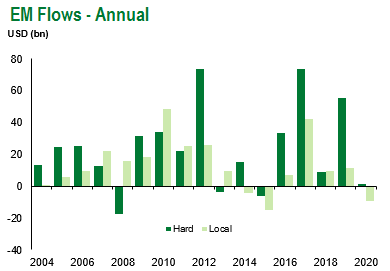
Source for graphs: Bloomberg, JPMorgan, Gramercy. As of October 9, 2020.
COVID Resources
Emerging Markets COVID-19 Case Summary
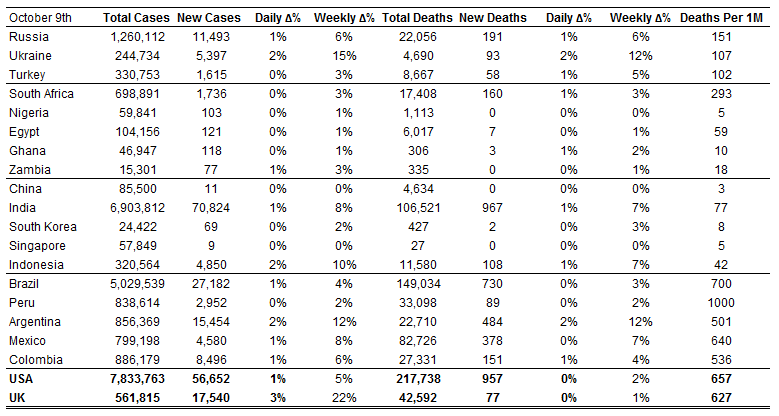
Source: Worldometer as of October 9, 2020.
Additional Crisis Resources:
Johns Hopkins COVID-19 Case Tracker
For questions, please contact:
Kathryn Exum, Senior Vice President, Sovereign Research Analyst, [email protected]
Petar Atanasov, Senior Vice President, Sovereign Research Analyst, [email protected]
Tolu Alamutu, Senior Vice President, Corporate Research Analyst, [email protected]
James Barry, Vice President, Corporate Research Analyst, [email protected]
This document is for informational purposes only. The information presented is not intended to be relied upon as a forecast, research or investment advice, and is not a recommendation, offer or solicitation to buy or sell any securities or to adopt any investment strategy. Gramercy may have current investment positions in the securities or sovereigns mentioned above. The information and opinions contained in this paper are as of the date of initial publication, derived from proprietary and nonproprietary sources deemed by Gramercy to be reliable, are not necessarily all-inclusive and are not guaranteed as to accuracy. This paper may contain “forward-looking” information that is not purely historical in nature. Such information may include, among other things, projections and forecasts. There is no guarantee that any forecasts made will come to pass. Reliance upon information in this paper is at the sole discretion of the reader. You should not rely on this presentation as the basis upon which to make an investment decision. Investment involves risk. There can be no assurance that investment objectives will be achieved. Investors must be prepared to bear the risk of a total loss of their investment. These risks are often heightened for investments in emerging/developing markets or smaller capital markets. International investing involves risks, including risks related to foreign currency, limited liquidity, less government regulation, and the possibility of substantial volatility due to adverse political, economic or other developments. The information provided herein is neither tax nor legal advice. Investors should speak to their tax professional for specific information regarding their tax situation.